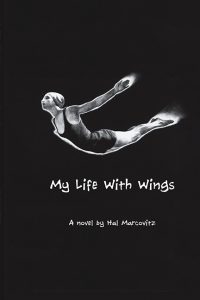
How did you come to self-publish? Did you try to get published traditionally?
Of course, I pitched the book to a number of agents and publishers and was rejected. I spent more than thirty years in newspaper journalism and book publishing–a fact I always pointed out in my cover letters. And yet I received the same old tired rejections. If somebody with a writing background can’t get an agent or publisher to say more than “Sorry, not for us,” it seemed to me self-publishing was the only course left to take.
What self-publishing service did you use? Happy with the service?
I went with LuLu. LuLu’s basic fee to upload is pretty reasonable. I believe their intent is to sell you all manner of publicity packages, at very expensive rates. I rejected the packages and decided to do it on my own.
What avenues have you taken to market the book? Have you gotten reviews, interviews, TV, print media coverage?
I put together my own website–mylifewithwings.com–as well as a Facebook page, Twitter account and a Google blog. You can find links to all my social media on mylifewithwings.com. I entered the book in a number of independent literary contests and received some awards and very good reviews. None of that has translated into sales. I really didn’t self-publish the book to sell a million of them–although that would be nice–but for the satisfaction of seeing it in print. I order a batch myself from time to time and give them to friends. But here is something really, really weird: I can track my website hits through Google Analytics. For reasons I don’t understand, I receive most of my hits from Internet surfers in Brazil. Really. They don’t stay on the site long, just a few seconds. But they are clearly my biggest audience. I suspect the term “My Life With Wings” means something in Portuguese, although I’m not sure what it might be.
What drove you to write this particular book?
I don’t really remember how I got the idea because I wrote the first draft back in the 1990s. I enjoy surreal art and magic realism in literature, and so I was naturally drawn to that genre. I’m sure it occurred to me at some point that the story of a guy who grows wings, and doesn’t know what to do about it, would make a funny and poignant story. After writing the book in the 1990s I shipped it out to some agents and publishers, received my rejections, then put it aside. A few months ago I had some time on my hands and decided to resurrect the project and self-publish. After winning those literary contests, feeling I now had some traction to spark some interest, I submitted the book to some more agents and received the same old rejections.
Is the book in any one particular genre? Is it a genre that’s familiar to you?
 I guess you can call it Magic Realism. As I said, it is a favorite genre. My first novel–the novel you write to throw away–was titled Confessions of an American Spider. It told the story of the world according to a philosophical spider, who mused on life, art and everything else as he sat in his web. Every once in a while a bug would become ensnared in the web and the spider excused himself, advising the readers, “Oh, you’ll have to give me a minute. Dinner just arrived and I have to suck out this guy’s juices.” It was a lot of fun to write but I’m sure not very marketable. Maybe I will take another look at it when I get the chance.
I guess you can call it Magic Realism. As I said, it is a favorite genre. My first novel–the novel you write to throw away–was titled Confessions of an American Spider. It told the story of the world according to a philosophical spider, who mused on life, art and everything else as he sat in his web. Every once in a while a bug would become ensnared in the web and the spider excused himself, advising the readers, “Oh, you’ll have to give me a minute. Dinner just arrived and I have to suck out this guy’s juices.” It was a lot of fun to write but I’m sure not very marketable. Maybe I will take another look at it when I get the chance.
Who are your greatest writing influences?
I really enjoy Nicholson Baker, who writes fiction and nonfiction. I am also a big fan of the late Hunter Thompson, who first sparked my interest in New Journalism and is probably at least partially responsible for my decision to enter journalism back in the 1970s, although soon after getting my first newspaper job I discovered I would not be making a living as a New Journalist. Newspapers back then, as now, were pretty set in their ways, which may explain the death of print journalism in America. I also enjoy the Hitchhiker Guide to the Universe books by the late Douglas Adams. Mostly, I enjoy anything weird and off-the-wall, whether it is fiction of nonfiction.
What’s your writing regimen? Any tips for keeping focused?
I have been a freelance writer since 2006, having left my last newspaper job shortly before the company went bankrupt. Mostly, I work as a contract writer for publishers who produce books for the school library market although I accept other assignments as well. Recently, I copy-edited a novel for a first-time novelist and I am also working on a book for a Washington think tank. A year ago I headed a project about bullfighting in the 21st century that included contributions from 70 writers, photographers and illustrators. (Ole! Capturing the Passion of Bullfighters and Aficionados in the 21st Century.) I judge books for a literary contest. So I am pretty busy. I am able to work around the other activities in my life–travel, regular workouts at the gym, King of the Hill reruns on Adult Swim, B&W film photography, family, and golf.
Would you self-publish again?
Probably. I may look over the Spider book again and see if I can make it readable.
Any final words of advice for those looking to self-publish?
Just do it. Don’t let the nattering nabobs of negativity in the mainstream publishing industry discourage you. I worked for 30 years in an industry that refused to change with the times, and now print journalism in America is a dinosaur. Traditional book publishing is heading the same way.
Get an Editorial Review | Get Amazon Sales & Reviews | Get Edited | Get Beta Readers | Enter the SPR Book Awards | Other Marketing Services






















Leave A Comment